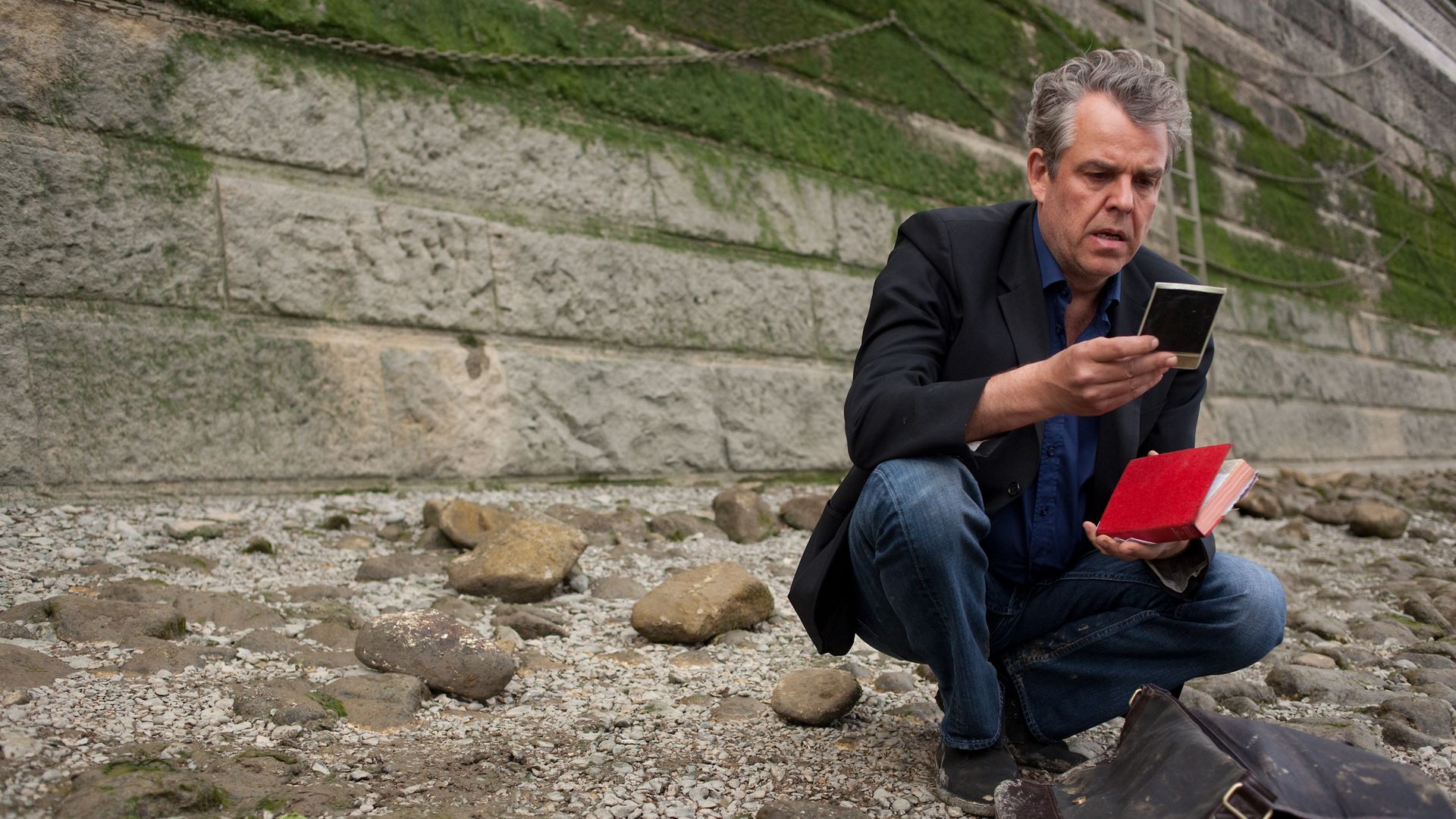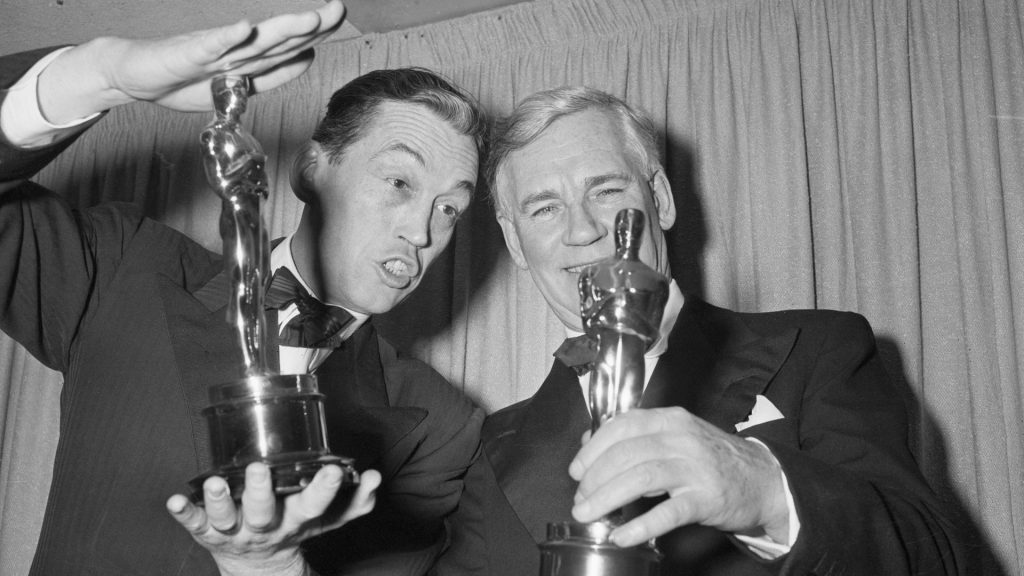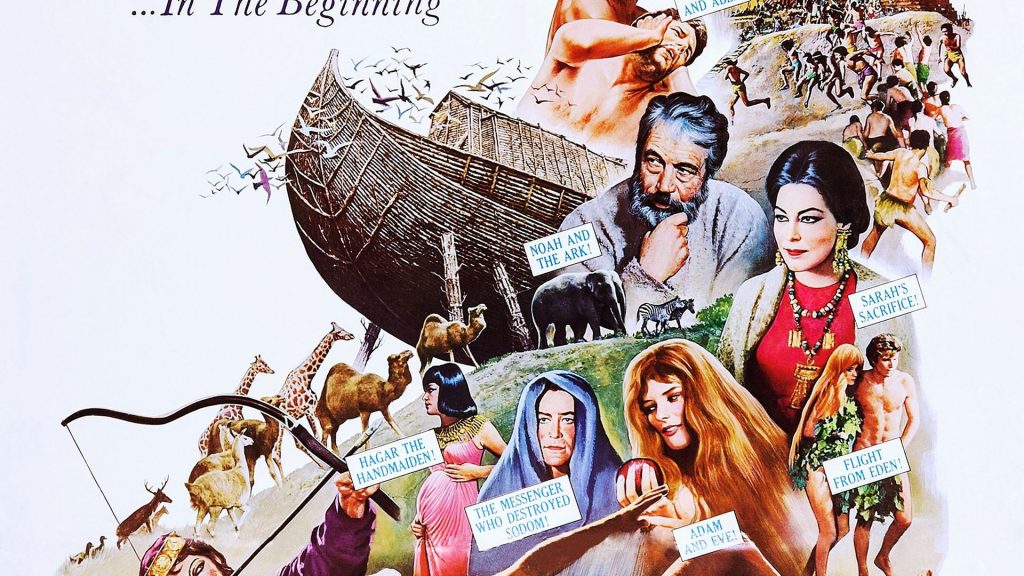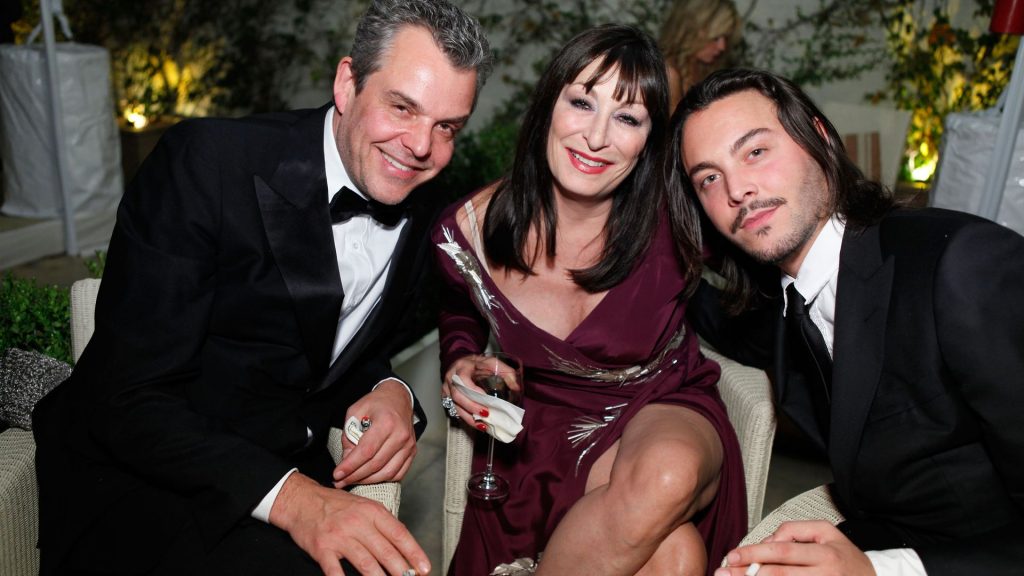
Danny Huston’s grandfather, his dad and his sister all won Oscars, creating a Hollywood dynasty. No pressure, then.
Movie night when Danny Huston was a kid probably sounds a little different to the ones we’ve all held with our families in lockdown.
“There was always a big palaver about getting the projector out,” he says in a gravelly voice that savours its words, like someone chewing tobacco around their mouth. “We’d lace the film and it would rip and scratch and the bulb would blow and there’d be a fuss while somebody fetched a replacement bulb and then, finally, there’d be a beam of light that cut through the cigar smoke wafting around the room emanating from my father and then, a flicker on the wall and it would be The Maltese Falcon or The Treasure of the Sierra Madre and my Dad would say, “Danny, you see that man up there, the one doing a jig, that’s your grandfather, a great man, name of Walter Huston’.”

I have to admit I’m always a little nervous to bring up Danny Huston’s illustrious film-making family and heritage but he never shies away from talking about it. Indeed, the more he talks about it, the more animated and eloquent he becomes, relishing the memories with pride.
After nearly 20 years away from the director’s chair his father John so legendarily filled in Hollywood and beyond, Danny is, as he puts it, “back in the saddle” for The Last Photograph, a remarkably poignant film about a father grieving his son in the wake of the 1988 bombing of Pan Am Flight 103 to New York over the Scottish town of Lockerbie.
Does the voice of his father, who made incontestable classics including The African Queen and Key Largo as well as The Misfits, The Asphalt Jungle, Prizzi’s Honour and The Dead. Having grown up on movie sets and watched his father work, does Danny hear the voice of his father when he’s directing?
“It’s not like he’s in my ear but everyone tells me I sound like him when I’m giving orders on set,” smiles Danny. “But I do always carry his advice with me that goes back to when I was a teenager and I was flailing about with a Super 8 camera and he caught me shining the lens around and he bellowed: ‘Stop right now. Tell me, going from left to right, right to left, what do you see – you blink, that’s right, well, that’s a cut. So, concentrate on what you’re trying to say, and not on all the nonsense around it.’ That,” says Danny with an almost triumphant sense of pride, “was my first film lesson and it’s actually a pretty good life lesson, too. It has also helped me with acting, makes you pinpoint your vision and what you’re trying to say with it.”
Danny’s vocal similarity to his father came to a head most recently in 2018, when he was asked to dub some of his father’s lost dialogue for the completion of the unfinished Orson Welles film The Other Side of the Wind, a project funded by Netflix. Huston pere plays an irascible Hollywood filmmaker called Jake Hannaford around whom the frees-wheeling action of the film takes place; but, like most of the cast, he was long dead before the film could ever be completed for release. Danny was called in by the filmmakers and producers responsible for putting the long-shelved project back together and with Danny available to voice his father, the dream of bringing an Orson Welles film to the screen for the first time was made possible.
“I had the script and I dubbed the lines in the best approximation and intonation of my father’s voice that I could manage, but it wasn’t until they showed me the final version that I realised how extraordinary this was – there was my father talking up there on the screen but using words I had given him. I have to say that was probably the strangest feeling I’ve ever had, as if I had merged with him and somehow we were both appearing in this Orson Welles picture.”
Huston tells me he was so proud of the job that he has a large poster of the movie hanging in the entrance hallway of his LA house. He divides his time between LA and the Berkshire countryside, where he lives with his partner, the English actress Rosie Fellner. The couple have a daughter, Luna, and Danny’s mother, Zoe Sallis also lives there. From what I understand. The Huston living arrangements have always been rather complicated, Danny growing up in Ireland and Rome, his father constantly travelling “like a pirate returning with plunder” and then departing again, often taking Danny with him for the school holidays.
“I was in Mexico for Night of the Iguana, I know that,” says Danny. “And the one I’ll never forget is The Man Who Would Be King, in the high Atlas mountains and getting there to hang out with Sean Connery and Michael Caine, that was heaven for a kid, a proper Kipling adventure, quite magical.”
John Huston met Danny’s mother, Zoe Sallis, on the set of The Bible, the epic the famed Italian producer Dino de Laurentis persuaded Huston to come to Rome to direct. Sallis was playing Hagar and caught the eye of the married director who was playing Noah and also God and it came to pass that they begat Danny right there, in the Garden of Eden in 1962. Part of Danny’s childhood was spent in Rome before John moved to Ireland and took his boy with him.

There’s a particular filial melancholy, then, in The Last Photograph, which begins with a father, Tom (played by Huston) dropping off his son Luke (Jonah Hamer-King) at the airport – as it turns out for the last time. You can’t help but wonder if there isn’t something of the John and Danny relationship in these conversational scenes conducted driving out along the Westway to Heathrow, the father asking his son about his latest romance, the pair joking about the vagaries of Murphy’s Law and why it should be named after an Irishman.
“I suppose we did that lots of times,” concedes Danny. “He was off somewhere, or I was off somewhere, to school or to college or to film school in London. It felt part of the routine for us and in my film I wanted to get that familiarity because what’s about to happen is this shocking disaster, the Lockerbie bombing, that will change this father and son forever, and in some ways, change the world forever.”
I’ve never seen a feature film about Lockerbie before and Huston recaptures the event with archive footage interwoven with the drama of his own character going up to Scotland “to collect my son.” When he’s told there are no survivors (259 people died in Britain’s worst terrorist atrocity), the pain is palpable.
“I knew my father was dying long before he passed,” recalls Danny, “so it wasn’t the same kind of shock but what I could convey in The Last Photograph was the sense of loss that endures afterwards and in that aspect there’s certainly something of what I felt and feel in my father’s absence.”
Much of Huston’s film revolves around his character’s desperation to retrieve a valued photograph stolen in a casual robbery from his Chelsea bookstore. When I ask if there’s a lost photograph he himself treasures, he immediately cites a poster of his father and Muhammad Ali pretending to land punches on each other’s chin, a promotional pic taken in Ireland when Ali visited for a famous fight against Al Lewis in Dublin’s Croke Park in 1972. Huston was promoting his boxing film Fat City (one of the best boxing movies, starring Stacy Keach and Jeff Bridges) and cannily used Ali’s circus for extra hype.
“I had that picture on my wall in Rome as a teenager and I loved it,” recalls Danny. “It somehow got lost in the move from Rome to Ireland and I don’t know where it went and I haven’t seen it since, if I’m honest. I would love to see it, to find it. I assume it was an Irish press photographer who took it.”
In fact, a quick google reveals the image and that Huston screened Fat City for Ali and Lewis before their fight, events chronicled in a book The Big Fight, by Cork author Dave Hannigan. I must tell Danny.
“But that’s what is so wonderful and powerful about photos and images,” continues Danny. “They preserve a moment forever and give it meaning over time. It’s the same way through movies, I can see my grandfather, Walter, whom I never met, and how I can keep in touch with my father, through all his films, whether he’s in them or not. His voice very clear to me in all of them.”
It’s not easy to identify a John Huston movie, I suggest. What they have in common is excellence, rather than any particular trait or auteurist leanings. “There’s no signature style, I suppose,” agrees Danny, “but they’re many of them adapted by him from original books or plays for the screen and he has a knack for knowing exactly what the story is, the essence of it. But you get to the stage where he was doing Fat City, then Annie and The Man Who Would Be King and Escape to Victory, so there’s no obvious connection or even a typical shot. But I could tell you immediately you’re watching a John Huston movie.”
Five-times married, a fabled drinker and Hollywood roustabout, Huston was a friend of Hemingway and Welles, painter, drifter, soldier, raconteur, writer, actor and prolific director… like his character Noah Cross in Chinatown famously says to Jack Nicholson’s Jake Gittes: “Of course I’m respectable, I’m old! Politicians, ugly buildings and whores all get respectable if they last long enough.”
And John Huston went the distance, leaving a film legacy and a family dynasty. I wonder, then, if the long tentacles of the Huston network feel nepotistic? Most obviously, there is his half-sister Anjelica Huston (who’s starred in films for Woody Allen, Wes Anderson, Nic Roeg, Merchant Ivory and Stephen Frears) and his half-nephew Jack Huston who, at 38, has yet to break through as a leading star but has amassed many appearances in film and TV including Boardwalk Empire, The Irishman, American Hustle and the upcoming House of Gucci. Danny has worked with them both and says he’s very close to and proud of the extended family. “Anjelica introduced me to the Rolling Stones,” he says when I suggest that there might be some animosity in the family given father John’s liberal approach to marriage.

“He went into the family business himself, don’t forget,” says Danny. “So it was natural some of us would go into it. It was never assumed and certainly not obligatory and my father was always encouraging as long as it wasn’t the only string to your bow. He believed in amassing experience, otherwise one would have nothing to say. I went to film school, Jack studied drama, so we learned the ropes. There was no easy leg up. It took me a long time to break through, and even then it was a total surprise when it happened because it was as an actor, in a friend’s movie. “
Danny’s talking about the excellent LA noir Ivans XTC by Bernard Rose, a key indie movie from 2000, featuring Huston as a drug-addled agent, brilliantly capturing the listless surface of Hollywood. “You can be there for months thinking you’re making progress and in fact you’re lying by a pool doing drugs and nothing happens,” he says, as one in the know of the trappings of the LA lifestyle. “Dad hated it there really, had an aversion to fakery which is all he could see in Beverly Hills. I have had to learn how to navigate it and handle it, but yes, Ivans XTC is not unknown territory to me, let’s say.”
Danny himself is on his third marriage, after divorce from Virginia Madsen and from Katy Jane Evans, who committed suicide while they were separated. He is now with actress and producer Rosie Fellner, with whom he is working on several projects for him to direct. However, he is keeping the Huston acting connections going, having recently joined the cast of an adaptation of Hemingway’s last novel, Across The River And Into the Trees – a book first optioned by John Huston in 1976. Danny has played another of his father’s mates, Orson Welles, in the 2006 feature Fade to Black.
It does feel like the Huston name will never leave the big screen, still feeling the ripples of so mighty a career as that of John. Yet despite all those wonderful film noirs John made at the start of his career, it never feels like he’s casting a shadow, or that The Maltese Falcon, now celebrating its 80th anniversary, is any kind of albatross around the Huston necks.
The Last Photograph has a nice balance to it, a family affair, with Danny acting and directing and with its author, screenwriter and film executive Simon Astaire arranging some of the film to shoot in his late father’s house. “I like things to be honest,” says Danny. “My father could play a mean hand of poker and he certainly played the Hollywood studios at their game, but with family, he was nothing but honest, even if he mostly got his own way and did exactly what he wanted.
“And I try to run my life like that, and my film sets. I try to follow Dad’s advice, on film and in life: keep on track and don’t get confused by the many distractions on offer.”
The Last Photograph is available to stream on Amazon, Sky and Rakuten.
THE HUSTON FAMILY TREE
Danny Huston
Born in 1962. Key roles: Ivan Beckman in cult favourite Ivans XTC, Sandy Woodrow in The Constant Gardener, Samuel Adams in TV’s John Adams, General Erich Ludendorff in Wonder Woman. The Last Photograph is his fifth film as a director.
Walter Huston
1883-1950, Danny’s grandfather. Key roles: Howard in The Treasure of the Sierra Madre (best supporting actor Oscar, 1948), Sam Dodsworth in Dodsworth, title role in Abraham Lincoln.
John Huston
1906-1987, Danny’s father. Key films as director: The Maltese Falcon, The Treasure Of The Sierra Madre (best director and best screenplay Oscars, 1948), The African Queen, Prizzi’s Honour. Key role as actor: Noah Cross in Chinatown.
Zoe Sallis
Born 1940 in India, Danny’s mother. Key role: Hagar, concubine of Abraham in The Bible (1966), directed by John Huston.
Anjelica Huston
Danny’s sister, born 1951. Key roles: Maerose Prizzi in Prizzi’s Honour (best supporting actress Oscar 1985), Lily Dillon in The Grifters, Grand High Witch in The Witches, Morticia Addams in Addams Family Values.
Jack Huston
Danny’s nephew, born in King’s Lynn, Norfolk, in 1982. Father is Danny’s brother Tony; his mother is Lady Margot Cholmondeley. Key roles: Odis Weff in Fargo S4; disfigured gangster Richard Harrow in Boardwalk Empire.










